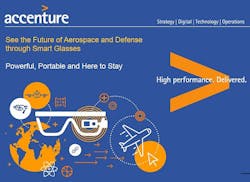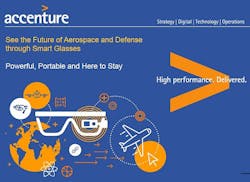Accenture and Airbus deliver wearable technology proof of concept for improving airplane cabin assembly
PARIS, 17 June 2015. Accenture is at Paris Air Show showcasing how industrial-grade, Internet-connected wearable technology can improve manufacturing, operations, supply chain, and maintenance processes. This demonstration aims to illustrate how smart glasses technology can enhance real-world industry applications using barcode scanning, data retrieval from the cloud, contextual instructions, augmented reality, 3D viewing and voice command.
Accenture and Airbus have delivered a proof of concept, using the latest wearable technology, to help Airbus operators reduce the complexity of assembling cabin seats and decrease the time required to complete this task. Through this proof of concept, a manufacturing professional can use digitally enabled, industrial-grade smart glasses to improve the accuracy and reduce the time required to complete the cabin seat marking process. This proof of concept shows how wearable technologies offer new and important benefits in the aerospace and defense industry.
Using contextual marking instructions, the smart glasses display all required information for an operator to help mark the floor faster and reduce errors to zero. In addition, the eyewear technology, implemented by Accenture, also offers interactivity by granting the professional access to features including barcode scanning, data retrieval from the cloud, voice command, and augmented reality.
Using this technology, all aircraft’s seat locations can be marked down to the last millimeter and checked for accuracy and quality. This method also proved to be especially critical for removing errors in the process. Overall, time spent per aircraft is divided by six, error rate reduced to zero and marking operations have been revalued.
For this proof of concept, Accenture selected the most appropriate hardware, designed and implemented the full solution, and regularly integrated end user feedback to increase the professional’s satisfaction.
Accenture looks forward to building on this successful proof of concept with Airbus by making it widely used in commercial aerospace and defense manufacturing.
The project was launched in January 2015. Completion of the first prototype was completed less than a month later. To accelerate the timeline, Airbus and Accenture worked in start-up mode, which enabled rapid iterations by both companies’ professionals.
Currently, the technology is being industrialized for A330 cabin furnishing. The other Final Assembly Lines should quickly follow along with other Airbus divisions.
Wearable technology provides instant access to critical information, improves quality, and helps increase collaboration. This technology enhances existing workflows and opens new opportunities in many aspects of the aerospace and defense industry. Wearable technology may also increase workforce productivity, reduces the risk of errors and eliminates the need for travel. Using this hands-free technology also improves safety in complex assembly or maintenance activities.

